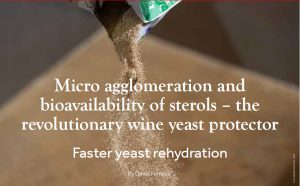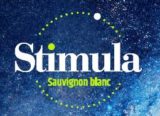Micro agglomeration & bioavailability of sterols – the revolutionary wine yeast protector
Faster Yeast Rehydration
🍷The impact on the fermentation process and final wine quality are now greater due to climate change, with higher sugar/ethanol contents, higher pH’s, off-flavours caused by yeast stress, sluggish or stuck fermentations and higher microbial contaminants. It is now crucial to select wine yeast in dry form (ADY) in the optimal physiological state to have healthy and active populations capable of completing alcoholic fermentation.
🔬Over the last 20 years, scientific information on yeast nutrition management in winemaking has significantly increased. The role of key nutrients, such as nitrogen sources, oxygen and micronutrients like vitamins and minerals, have been the subject of research and publications,5,1,7 showing their impact on fermentative activity and wine sensory profile.
🔬In parallel, specific research has focused on how sterols influence yeast’s physiological state and metabolism and how it was directly correlated with a secure end of fermentation.7,4,6 It has been shown that using specific yeast autolysates rich in sterols during the rehydration step of the ADY increases the fermentation activity and vitality during fermentation, particularly in the last part, when alcohol levels become toxic for the yeasts. This is related to improving yeast cell stress resistance correlated with better membrane integrity.
🍷ADY rehydrated with protectors (Go-Ferm Protect™/Go-Ferm Protect Evolution™) maintains their viability and vitality until the end of fermentation, decreasing the risk of stuck or sluggish fermentations, avoiding undesirable aroma production, and resulting in an increase of the aroma compound synthesis by the yeast with the protectors. The incorporation of the sterols in the ADY rehydrated with protector leads to an increase in their membrane lipid composition and healthier cell membrane. The protector effect is notable at different temperatures, high potential alcohol, lack of oxygen or low turbidity in white and rosés.
This article was published in the November issue of the WineLand magazine. Read the full article at the link below:
Micro agglomeration bioavailability of sterols





